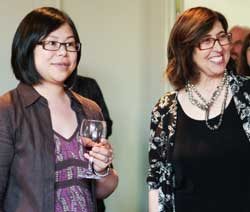Human development across disciplines

CRDH Acting Director Karen Li (left) and Lisa Serbin address the crowd during the CRDH’s 25th anniversary party. Serbin will be resuming her directorship of the centre when she returns from sabbatical in July.
Photo by Kate Hutchinson
A few years ago, provincial funding agencies restructured, and the Centre for Research in Human Development (CRDH) was asked to expand its mandate.
“We are well recognized internationally as a concentration of developmental researchers,” said Acting Director Karen Li. “They [the FQRSC — Fonds québécois de la recherche sur la société et culture] wanted us to team up with experts in other disciplines to approach targeted social problems — for example, children at risk for developmental problems by virtue of their family characteristics.”
The shift in 2003 to multidisciplinary problem-solving has resulted in a number of new opportunities for the CRDH, which recently celebrated its 25th anniversary at a lovely reception in its Loyola offices.
What began in 1981 with five researchers in Concordia’s Psychology Department has grown to include 37 full members from Concordia, McGill, UQAM, Université Laval and Collège de Maisonneuve, representing decision sciences, education, epidemiology, exercise science, geography, psychology, political science and sociology.
Add to that over 150 graduate students and post-doctoral fellows and it’s easy to see why the CRDH has been collecting headlines and research funding over the last year.
“It’s great to get researchers from different disciplines in the same room talking to each other,” Li said. Those conversations can open the door to new collaborations. “Dolores Pushkar [of Concordia Psychology] and Giovani Burgos [of McGill Sociology] realized that they were both interested in poverty, but from very different angles.”
It was common ground that required some effort to uncover. “You have to translate your own jargon into understandable terms,” Li said of interdisciplinary exchange.
The potential for positive outcomes, once that translation is accomplished, is great. Li has been collaborating with professors in Exercise Science. Through that partnership, she has incorporated techniques she had never been exposed to before. “It’s been extremely enriching. There are literatures that I would have otherwise been completely unaware of.”
Faculty and grad students are accessing previously unfamiliar equipment, computer programs or methodologies.
There are still challenges, some exacerbated by the growing size and scope of the centre. “It’s a work in progress, trying to matchmake more than 37 full members and international collaborators.”
Getting people to interact across distance, as well as discipline, is not always easy. “We would like to develop a virtual communications set-up, so we can have video-conferencing, or we can have people view our speakers online and participate remotely.”
That may be partly behind the CRDH’s plans to offer two graduate scholarships to students who can help translate the CRDH’s findings to the general public. One student will develop an internet journal, the other will organize a lecture series.